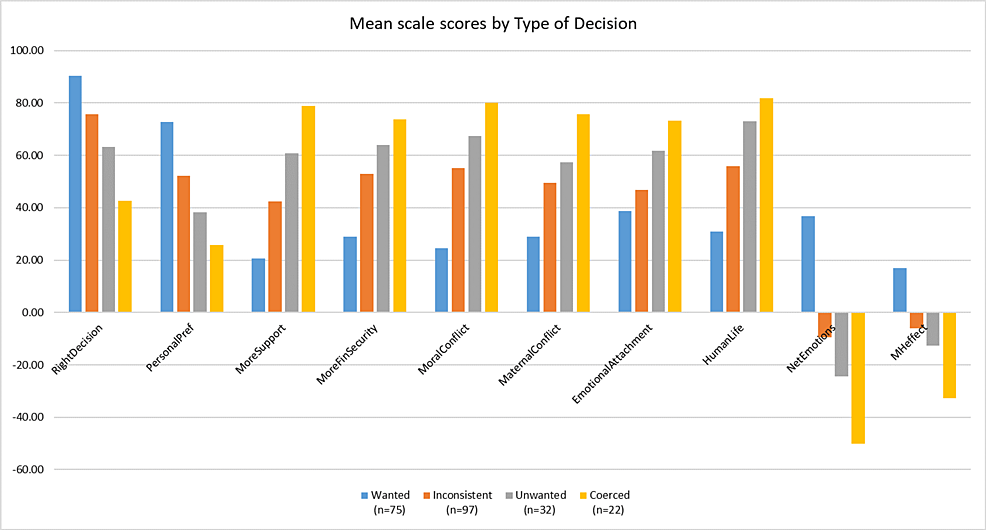Most Abortion Choices Violate Women’s Own Preferences, New Study Examines Harms When Abortion is Not Freely Chosen
Washington, DC (May 11, 2023) — The assumption that abortions only occur when women freely want them has been overturned by a new study interviewing a national sample of 1000 women 41 to 45 years of age. Of women with a history of abortion, only 33% described their abortions as a “wanted and consistent with my values and preferences.” All others, described it as contrary to their values and preferences, with 24% also describing their abortions as “unwanted” or “coerced.”
The peer reviewed study was the second of the Charlotte Lozier Institute’s Unwanted Abortion Studies. In a previous study, researchers found that over 60% of women report high to moderate levels of pressure to agree to an abortion, with only 5% of women reporting they felt little or no pressure to choose their abortions.
“This study confirms earlier findings regarding the epidemic of unwanted abortions in America,” said the lead author, David Reardon, director of the Elliot Institute.
The new study also found that only the one-third of women whose abortions were consistent with their own values and preferences reported more benefits than harm from their abortions. The other two-thirds reported more negative effects and were more likely to report that their abortions contributed to a decline in their mental health.

The figure from the study above, published with permission, shows how only the women who characterized their abortions as wanted (blue bar) reported positive emotions more than negative emotions (NetEmotions) or claimed they had any mental health benefits (MHeffect). (See the two groupings on the right side of the above graph.) All other groups attributed more negative emotions and more mental health harms to their abortions.
Those who aborted contrary to their own values and preferences (orange, grey, yellow) were also less likely to describe that abortion was the right decision (RightDecision) “given their situation.” They were also more likely to report that the decision to abort violated their personal preferences (PersonalPref) and that they would have preferred to carry to term if they had received more support from other persons (MoreSupport) or if they had had more financial security (MoreFinSecurity). They also reported far higher levels of moral conflict, maternal conflict, emotional attachment to their aborted children, and were more likely to view their pregnancy as a human life rather than a clump of cells.
Nationally Representative Sample of Women vs Biased Samples
With a 91% completion rate, and an overall abortion rate that is identical to the national average for the 41-45 year old age group that was surveyed, the researchers concluded that their results are far more representative of the national population of women than are the non-random surveys initiated at abortion clinics.
“When abortion clinic staff invite women to participate in follow-up surveys, it is well established that the women who expect to have the most negative feelings are the least likely to agree,” said Reardon. “That is why the infamously inaccurate Turnaway Study had only a 31% participation rate. It most likely excluded the vast majority of women whose abortions were unwanted or coerced which is one reason why their stories are seldom being told.”

“We need to throw out the dangerous assumption that ‘freedom of choice’ reflects the reality behind most women’s experiences with abortion,” said Reardon, “Only a minority of abortions are freely chosen to satisfy the woman’s own needs and preferences.”
Unwanted and Unsafe Abortions Can be Prevented
Reardon believes these findings offer new common ground for a country divided over abortion.
If the majority of abortions could be eliminated in a way that helps women to handle problem pregnancies in a manner that better satisfies their own values and preferences, Reardon believes that would be a win for both pro-lifers and those who are truly advocates of women’s rights.
“At the very least, no abortion should be an unwanted abortion,” said Reardon. “It is up to abortion providers to ensure that no abortion ever causes more harm than benefits to one of their patients.”
He believes that goal can be achieved simply by making it easier for women to sue abortion providers whenever they are negligent in screening for coercion and other risk factors.
“Everywhere else in medicine it is the duty of the physician to form an evidence-based risk versus benefits assessment,” said Reardon. “We need laws that hold abortion providers accountable for doing exactly that.”
“Those who claim they are already doing a good job of pre-abortion screening and counseling should support laws that will make sure that less conscientious abortionists will rise up to their same high quality of care,” said Reardon. “But anyone who insists that liability for better screening and counseling is unnecessary, or who hides behind the ‘buyer beware’ excuse that they are ‘just providing what women choose,’ clearly wants to continue profiteering off of the majority of women who are being coerced into unwanted and unsafe abortions.”
“If an abortion is not freely wanted and consistent with a woman’s own preferences and values,” says Reardon,“it is both unsafe and an exploitation of women who deserve better.”
###
Citing:
Reardon DC, Rafferty KA, Longbons T. The effects of abortion decision rightness and decision type on women’s satisfaction and mental health. Cureus, 2023 May 11; 15(5): e38882. doi:10.7759/cureus.38882
Reardon DC, Longbons T. Effects of pressure to abort on women’s emotional responses and mental health. Cureus, 2023 Jan 31; 15(1): e34456. doi:10.7759/cureus.34456


Dear Dave,
Thank you for this article. I will have it available when I have a table at conferences showing
pamplets and resource information on the effects of abortion and healing programs that are available.
Thank you, David, for this sending out this latest study which confirms that the vast majority of abortions are unwanted and not a choice at all.